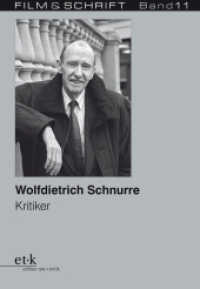Full Description
Methodological know-how has become one of the key qualifications in contemporary linguistics, which has a strong empirical focus. Containing 23 chapters, each devoted to a different research method, this volume brings together the expertise and insight of a range of established practitioners. The chapters are arranged in three parts, devoted to three different stages of empirical research: data collection, analysis and evaluation. In addition to detailed step-by-step introductions and illustrative case studies focusing on variation and change in English, each chapter addresses the strengths and weaknesses of the methodology and concludes with suggestions for further reading. This systematic, state-of-the-art survey is ideal for both novice researchers and professionals interested in extending their methodological repertoires. The book also has a companion website which provides readers with further information, links, resources, demonstrations, exercises and case studies related to each chapter.
Contents
Introduction: investigating language variation and change Manfred Krug, Julia Schlüter and Anette Rosenbach; Part I. Collecting Empirical Data: Section 1. Fieldwork and Linguistic Mapping: 1. Collecting ethnographic and sociolinguistic data Daniel Schreier; 2. Using participant observation and social network analysis Lynn Clark and Graeme Trousdale; 3. Computer mapping of language data William A. Kretzschmar, Jr; Section 2. Eliciting Linguistic Data: 4. Designing and conducting interviews and questionnaires Manfred Krug and Katrin Sell; 5. Obtaining introspective acceptability judgements Thomas Hoffmann; Section 3. Alternatives to Standard Reference Corpora: 6. Using historical literature databases as corpora Julia Schlüter; 7. Using the OED quotations database as a diachronic corpus Günter Rohdenburg; 8. Using web-based data for the study of global English Marianne Hundt; Part II. Analysing Empirical Data: Section 4. Corpus Analysis: 9. Using 'small' corpora to document ongoing grammatical change Christian Mair; 10. Using tag sequences to retrieve grammatical structures Sebastian Hoffmann; 11. Categorizing syntactic constructions in a corpus Nicholas Smith and Elena Seoane; Section 5. Phonetic and Phonological Analysis: 12. Analysing phonetic and phonological variation on the segmental level Ulrike Gut; 13. Analysing phonetic and phonological variation on the suprasegmental level Ulrike Gut; 14. Reconstructing stress in Old and Middle English Donka Minkova; Section 6. Combinations of Multiple Types of Data: 15. Combining elicitation data with corpus data Anette Rosenbach; 16. Using convergent evidence from psycholinguistics and usage Marilyn Ford and Joan Bresnan; 17. Applying typological methods in dialectology Lieselotte Anderwald and Bernd Kortmann; Part III. Evaluating Empirical Data: Section 7. Basic Statistical Analysis: 18. Quantifying variation and estimating the effects of sample size on the frequencies of linguistic variables Heikki Mannila, Terttu Nevalainen and Helena Raumolin-Brunberg; 19. Elementary statistical testing with R Stefan Th. Gries; Section 8. Multifactorial Analysis: 20. Analysing and interpreting variation in the sociolinguistic tradition Sali A. Tagliamonte; 21. Identifying multidimensional patterns of variation across registers Douglas Biber and Bethany Gray; 22. Computing linguistic distances between varieties April McMahon and Warren Maguire; 23. Analysing aggregated linguistic data Benedikt Szmrecsanyi.








